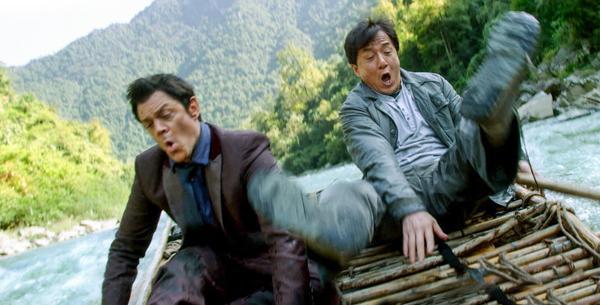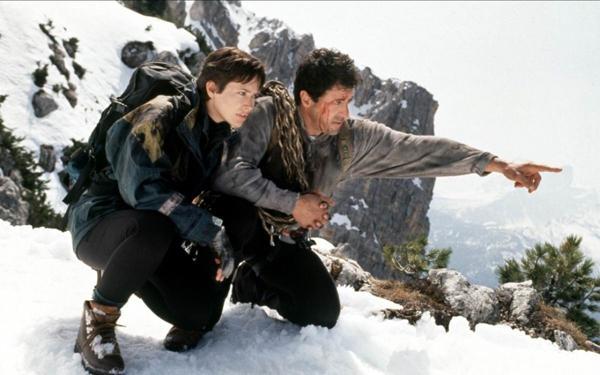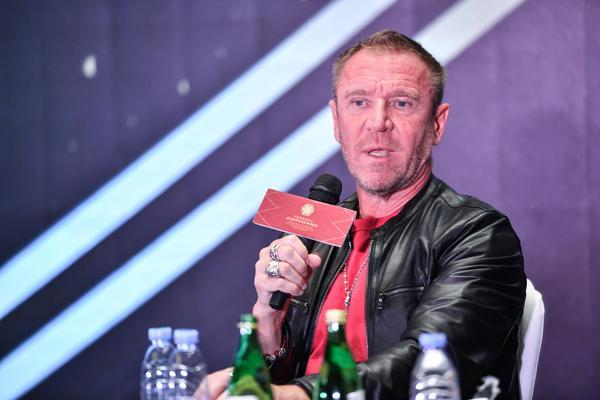Renny Harlin became a director when he was just 7 years old.
Today, he's one of the most commercially successful Finnish directors in Hollywood. Harlin established his fame in the late 1980s, thanks to such action blockbusters as Cliffhanger, starring Sylvester Stallone, and Die Hard 2, starring Bruce Willis.
However, the 59-year-old veteran, who has lived in China since 2014, had a somewhat tough, self-made start.
Harlin delivered a detailed account of his past struggles during a recent master class hosted by the China Film Foundation's Wu Tianming Film Summit for Young Talent.
Born in Riihimaki, a town 70 kilometers north of Helsinki, Harlin's first foray into directing was to use a tape recorder and recruit some neighborhood children to produce an audio story.
When the production wrapped up, he invited all his classmates to sit in the field outside his family's yard, and used a loudspeaker to broadcast the recording.
It felt so powerful to be able to tell a story and entertain all the neighborhood kids, he recalls, smiling.
The young artist upgraded his directorial skills at the age of 11, when he got a camera to shoot a short war film. He used miniature toy soldiers and planes, as well as some small fireworks, to create a fierce battlefield, and cast the neighbor kids as actors.
But it was not until he was 15 that Harlin experienced what it would be like to work as a professional director. That year, Hollywood action director Don Siegel toured to Finland to shoot the spy thriller, Telefon, which starred US actor Charles Bronson.

For the first time in his life, Harlin saw a large film set full of cameras, tracks and equipment. The most impressive moment for him was when a helicopter landed, and Siegel stepped out of it with a cigar in his mouth. The director walked to a chair with his name on it and sat down to be surrounded by obliging assistants before bellowing out the signal to start rolling: Action!
At that moment I realized that's what a film director is, and it was the only thing I wanted to do, he says.
It was not because he (Siegel) was so cool. It was because I realized that, as a director, you have the power to lead a group of talented people to create great entertainment.
Against the wishes of his parents, who had hoped he would become a doctor or an architect, Harlin painstakingly worked through a two-week examination-eventually outperforming hundreds of rivals-to be admitted to a film college in Finland.
However, he was disappointed to find that his classmates-eight in total-had no chance of raising enough money to shoot a film in Finland, a country with a population of around 5 million.
He dropped out of the academy, sending nine scripts to the government-backed Finnish Film Foundation. But they all failed to secure funding because they were too entertainment-driven.
Such government funding is usually reserved for art or educational films with in-depth themes in many countries.
At age 23, Harlin traveled to the United States. The journey taught him how to sell an idea, even without a completed script, and he used the newfound skill to fund his first feature-length film, Born American-which, at the time, became the most expensive film ever made in Finland.
However, it was a tough road. Unable to choke back tears, Harlin recalls that he and a friend borrowed around $500,000 to recruit a giant star, who failed to show up as scheduled, despite the fact that they'd prepared everything at the location, which had been expensive to rent.
We were sitting in my friend's basement, crying. His wife was throwing all her shoes at me, roaring: 'Renny Harlin, you've destroyed our life!' he recalls.
Quite dramatically, a shoe hit him in the head and triggered an idea: to use the sets, props and crew to at least shoot some action sequences.
So, he quickly arranged a flight to the US to hire three young, unknown actors and shot 25 minutes of footage, featuring explosions and gunfire, which he used to successfully attract a studio in Hollywood to finance the rest of the movie.

Born American grossed $3.4 million in the US, but Harlin still led a hard life in Hollywood, as he endured huge debts due to the complex nature of the film's contract.
Things took a turn for the better when, in 1988, producer Irwin Yablans offered him the script of Prison, a horror film shot in the Old State Prison in Wyoming. It helped Harlin not only to master the directorial procedures in Hollywood but also to improve his English.
In the same year, he landed the directors chair for A Nightmare on Elm Street 4: The Dream Master, which became the highest-grossing film in the series until the 2003 release of Freddy vs. Jason.
The success earned him a foothold in Hollywood, bringing bigger opportunities, such as a chance to direct Alien 3, although he ended up quitting the project over creative differences.
Harlin's cache continued to rise, however, as he found himself working with Hollywood stars like Bruce Willis in Die Hard 2 and Samuel Jackson and Geena Davis in The Long Kiss Goodnight.
In 2014, Harlin directed the Jackie Chan action flick, Skiptrace, for which he traveled across half of China with around 400 Chinese crew members.
It became a turning point for Harlin, who decided to shift his focus to China, where he now resides and has founded his own company.
The film industry is getting smaller and smaller in Hollywood, he observes. The studios' films are mostly superhero films and very little else.
In China, the film industry is growing, and I'm really excited to be part of it.
He also hopes his from-striving-to-thriving story will encourage emerging Chinese filmmakers.
Don't give up. Follow your heart and keep going, the emotional filmmaker concludes.
(CHINA.ORG.CN)

